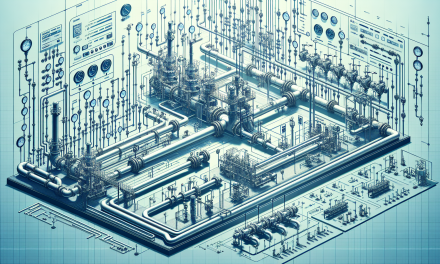Table of Contents
- Introduction
- Understanding Corrosion
- Impact of Corrosion on the Oil & Gas Industry
- Corrosion Control Techniques
- Advanced Technologies in Corrosion Control
- Training and Education in Corrosion Control
- FAQs
- Conclusion
Introduction
The oil and gas exploration industry faces numerous challenges, among which corrosion stands out as a significant concern. The aggressive environments in which these operations occur contribute to the deteriorating impacts of corrosion on equipment, pipelines, and overall safety. To effectively manage corrosion and its repercussions, companies must implement robust corrosion control strategies. This blog post delves into various aspects of corrosion control, offering insights, techniques, and the importance of specialized training while maintaining a friendly and accessible tone.
Understanding Corrosion
Corrosion refers to the gradual destruction of materials, typically metals, through chemical reactions with their environment. In the context of the oil and gas exploration industry, corrosion manifests due to several factors, including moisture, saltwater, and the presence of corrosive agents such as hydrogen sulfide (H2S) and carbon dioxide (CO2). Understanding the types of corrosion, including uniform corrosion, pitting, galvanic corrosion, and stress corrosion cracking, is crucial for selecting the right control methods.
Types of Corrosion
Corrosion can exhibit different forms, with each presenting unique challenges.
1. Uniform Corrosion: This occurs evenly across a surface and leads to a gradual reduction in thickness.
2. Pitting Corrosion: Characterized by small holes or pits forming in the material, leading to localized damage.
3. Galvanic Corrosion: Occurs when two dissimilar metals are in contact within an electrolytic environment.
4. Stress Corrosion Cracking: Caused by the combined effects of tensile stress and a corrosive environment, this can lead to catastrophic failures.
Impact of Corrosion on the Oil & Gas Industry
Corrosion poses a myriad of issues for the oil and gas industry. Firstly, it can lead to operational inefficiencies, resulting in increased maintenance costs and unplanned downtime. Furthermore, the safety hazards associated with corrosion can be dire, potentially causing leaks or failures in pipelines and equipment. Ultimately, these issues not only impact profitability but can also damage company reputations.
Financial Implications
The financial implications of corrosion incidents are staggering. According to industry studies, the oil and gas sector loses millions annually due to corrosion-related damages. This highlights a pressing need for effective corrosion control strategies to mitigate these losses.
Environmental Concerns
Corrosion can also severely impact the environment. Leaks from corroded pipes can lead to hazardous spills, posing threats to surrounding ecosystems and communities. Therefore, implementing corrosion control is not only a safety and financial concern but a crucial step towards environmental stewardship.
Corrosion Control Techniques
Implementing an effective corrosion control program involves a combination of methods. Companies should assess their specific operations to determine the best strategies for their unique environments. The following techniques are widely adopted in the industry:
Protective Coatings
One of the most common methods of corrosion control is the use of protective coatings. These coatings act as barriers between the metal and the corrosive elements within the environment, significantly extending the life of equipment and pipelines. Regular inspections ensure that these coatings remain intact and effective.
Corrosion Inhibitors
Another technique involves the application of chemical corrosion inhibitors. These substances, introduced into the environment, work to slow down the corrosive process, thereby protecting metal surfaces. Choosing the right inhibitor requires a thorough understanding of the corrosive agents present.
cathodic Protection
Cathodic protection is a technique used primarily for buried or submerged metal structures. By applying a small electrical charge to the metal, it effectively reduces the corrosion rate. This method is especially beneficial for pipelines.
Advanced Technologies in Corrosion Control
As the oil and gas industry evolves, so do the technologies available for managing corrosion. Innovations in materials science and engineering offer new solutions that enhance existing methods. Companies must stay updated with these advancements to remain competitive and maintain safety standards.
Smart Sensors
Smart sensors equipped with IoT technology can significantly enhance corrosion monitoring and management. These sensors provide real-time data on the condition of assets, enabling proactive maintenance and quick responses to any corrosion issues.
Data Analytics
Utilizing data analytics allows companies to predict corrosion patterns and assess risks more accurately. By analyzing historical corrosion data, organizations can make informed decisions on preventive measures and resource allocation.
Training and Education in Corrosion Control
Employing a knowledgeable workforce is essential in combating corrosion effectively. Continuous education and practical training equip employees with the necessary skills and understanding to implement corrosion control strategies efficiently. For instance, the Corrosion Control Course for the Oil & Gas Exploration Industry offers valuable insights into corrosion management tailored for professionals in this field.
Importance of Certification
Certification programs enhance credibility and ensure that employees are well-versed in the latest corrosion control technologies and practices. They provide essential knowledge and an understanding of regulatory requirements, further enhancing workplace safety.
FAQs
What causes corrosion in the oil and gas exploration industry?
Corrosion in the oil and gas exploration industry can be caused by several factors, including exposure to moisture, saltwater, and specific corrosive agents like H2S and CO2.
How can companies reduce the impact of corrosion?
Companies can reduce corrosion impacts by implementing protective coatings, utilizing corrosion inhibitors, ensuring proper material selection, and adopting regular inspection and maintenance practices.
What technologies help combat corrosion?
Advanced technologies such as smart sensors for real-time monitoring and data analytics for predictive maintenance can significantly enhance corrosion management strategies.
Conclusion
Corrosion control in the oil and gas exploration industry is critical for ensuring operational efficiency, safety, and environmental protection. Understanding the types and causes of corrosion is essential in selecting the appropriate mitigation strategies. By adopting various control techniques, leveraging advanced technologies, and emphasizing training and education, companies can effectively combat corrosion. For further insights into ensuring optimal operations, check out these resources: Essential Insights into Oil and Gas Pipeline Operations, Mastering Building Envelope Inspections, Mastering Process Plant Troubleshooting, Maximizing Refinery Process Yields, and Comprehensive Safety Audit and Site Inspection Training. With proactive management and continuous improvement, the oil and gas exploration industry can ensure the integrity and sustainability of its operations.





